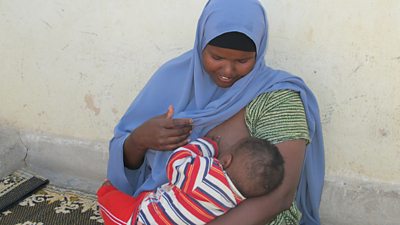Downloads
Publication date: July 2012
Summary
- ����ý Media Action UNICEF-funded health programming in Somalia is supporting nutrition, hygiene and health seeking among young mothers, husbands and older women.
- Many young mothers did not understand that ‘immediate breastfeeding’ means within one hour of delivery. Although mothers were aware of the importance of exclusive breastfeeding, many young mothers did not carry out this practice as there was a misunderstanding that exclusive breastfeeding also means giving water and other milk.
- Despite young mothers saying they were aware that complementary feeding after six months is important, they did not know that they should be feeding infants nutrient-rich foods.
- When children were ill, young mothers were not giving their children more fluids or oral rehydration salts.
Context
Somalia, particularly the South Central region of Somalia, has been without a stable functioning government and in a state of protracted civil war for two decades.
In 2011, the worst drought in 60 years hit the country and a state of emergency related to the famine was declared in South Central. Maternal mortality ratio is very high. Radio is the most dominant media in Somalia and remains a crucial source of information for a vast proportion of the population.
The project
This project aimed to support nutrition, hygiene and health seeking in Somalia through the use of radio drama, discussion programmes and outreach work. The programmes initially focused on:
- optimal maternal nutrition and support for reduced workloads for pregnant women
- early initiation of breastfeeding and exclusive breastfeeding for six months
- appropriate complementary feeding for children
- appropriate feeding and treatment seeking for sick children
- community detection and referral of malnourished children
- appropriate hand-washing, use of sanitary facilities and disposal of faeces
These broad areas were refined to six specific behaviors as a result of this formative research.
Research methodology
In January and February 2012, ����ý Media Action undertook research into behaviours, attitudes and knowledge about health, nutrition and hygiene to inform the content of the radio programmes. ����ý Media Action held 36 focus groups and 27 in-depth interviews with mothers, older women and husbands in Somaliland and south central Somalia.
Findings
Many young mothers did not understand that immediate initiation of breastfeeding means breastfeeding within one hour of delivery. Although young mothers were aware of the importance of exclusive breastfeeding from birth to six months, many did not breastfeed exclusively during this period. Many were often providing water, soft food and other types of milk whilst saying they were ‘exclusively breastfeeding’. Husbands and older women held the same beliefs.
However, interviewees seemed confident in their ability to breastfeed immediately even it was against the advice of their mothers/mother-in-laws. They are likely to increase immediate and exclusive breastfeeding if they had increased information through the radio programmes and it was seen as socially acceptable to do so. Husbands and older women do seem to show support for young mothers breastfeeding for up to two years.
Young mothers did not know about recommended nutritional practices, including maternal and complementary feeding 6-24 months. There was a widely held belief that infants should be given ‘soft’ foods such as rice at six months, rather than foods containing essential nutrients. The other main barriers to a nutritious diet often were financial or due to a lack of availability of food.
When children suffered with diarrhoea, many young mothers did not know that they should give them more fluids or oral rehydration salts. When children became severely unwell, some women in rural areas still relied on traditional treatment methods but the majority of young mothers said that they would go to healthcare facilities.
Many interviewees mistakenly thought that water is safe to drink if it is ‘clear’ or ‘white’. Young mothers knew about the need for hand-washing and safe disposal of waste and felt able to follow good practice. Young mothers felt that by working first as individuals and families, and then raising awareness amongst neighbours, the community can work together to change hygiene and sanitation practices. But this feeling wasn’t held by husbands or older women who thought the government should be responsible for sanitation.
Implications
There is limited research about barriers and enablers to changing behaviours and norms related to maternal and child health in Somalia and so this research provides new insights. The research has identified where the radio programmes could encourage change. A focus on exclusive and immediate breastfeeding, the need to provide nutritious rather than ‘soft’ foods at six months would be beneficial. The inconsistent practices regarding safe water should also be addressed in programming.
